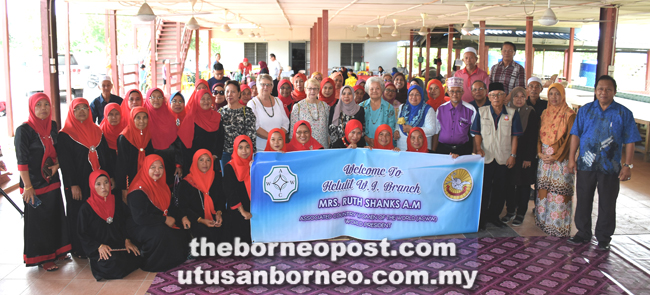
Standing front row –Ursula, Rosey, Shanks and Brennan having a photo call with the villagers and other visitors.
MIRI: Domestic violence against women continues to be a major problem globally, and governments as well as non-governmental organisations (NGOs) need to jointly find effective strategies to solve the problem.
Associated Country Women of the World (ACWW) world president, Ruth Shanks, said although she did not have statistics for such cases in Malaysia in most parts of the world it is a huge problem.
“Domestic violence against women is the greatest problem affecting rural women. It is a huge issue in most parts of the world.
“When we talk about isolation although we are connected by internet, within their countries, in their communities the victims are isolated. So those are issues the governments as well as organisations like ACWW need to address,” said Shanks when asked by the media during her visit to Kampung Pejuang, Kelulit in Bekenu on Saturday. ACWW in an open statement last year in conjunction with International Day for the Elimination of Violence against Women (November 25) and Human Rights Day (December 10) said the impact of violence against women is not just the physical and psychological damage done to women, but also weakening of communities.
“Gender-based violence retards development of safe, peaceful, healthy and productive nations.”
Shanks was accompanied to Bekenu by ACWW treasurer Heather Brennan, ACWW former world president Datuk Ursula Goh, SFWI exco member for Miri/Bintulu, Hilda Mesen Mayor, and chairman of SFWI Miri/Bintulu Habsah Daud. Among those welcoming them were Assistant Minister of Women, Family and Childhood Development Rosey Yunus, ACWW members, Pemanca Ali Mudin, Penghulu Junit Mulok, Kampung Penjuang Kelulit headman Hamdan Taha and chairman of SFWI Kampung Pejuang Kelulit Azimah Lazim.
On her visit to Miri where she visited rural women including in Kampung Pejuang Kelulit and members of the Sarawak Federation of Women’s Institutes (SFWI) who are members of the ACWW and also at the invitation of Datuk Ursula Goh, Shanks said it was part of her duties as world president. Shanks added the ACWW encouraged women and worked with them and also looked after the next generation because children too need to learn traditional crafts and other things that take them into the wider world.
“Unfortunately the wider world is not necessarily the best sometimes as there are no work opportunities,” she said, adding that they have to leave home which exposes them to dangers like violence against gender.
Shanks said among the services rendered by ACWW is funding projects, adding that branches of SFWI here can apply for such funds for their projects to uplift the standard of rural women in Sarawak. ACWW currently has 400 societies in 85 countries representing nine to 10 million rural women. Earlier in her speech, Rosey said her rural constituency of Bekenu has developed tremendously in all aspects.
“In the 70s Kampung Pejuang Kelulit was only accessible by rivers and jungle treks from Miri town, the return journey took at least two days but with the completion of the coastal road the journey is slightly more than half an hour now,” she said.
She said most of the people in Bekenu are farmers, and with modern technologies and easy communication they are mostly earning good income. During the function, the visitors were given a traditional Kedayan welcome and send-off. There were also demonstration of ‘ketupat’ making and exhibition of crafts and goods made by SFWI local members. Shanks and Brennan each planted a coconut tree at the compound of the community hall.

The visitors taking part in the joget as part of the send-off ceremony.






